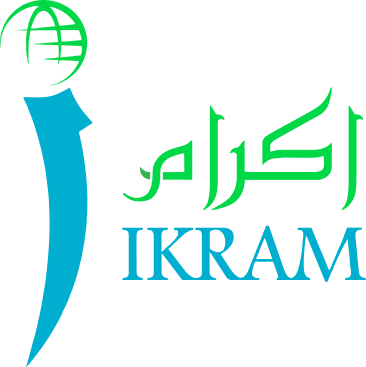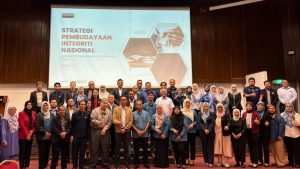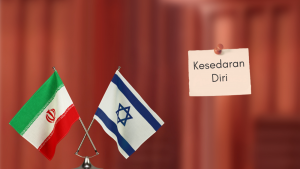The Islamic financial system has been in existence for decades and has contributed to the development of the financial system and increased awareness about a shariah-compliant alternative, whilst operating in an environment dominated by the conventional system.
However, despite its growth, the impact of Islamic financial system on society is unclear, due to potentially competing priorities, primarily profit against social impact. Crucially, how does the Islamic financial system contribute to the broader goals of economic justice and social well-being beyond the provision of a shariah-compliant alternative?
Government or state actors play key roles in achieving economic justice and social well-being as the main stakeholders and decision-makers in the formulation of relevant public policies and programmes. The financial system primarily plays a role in financial intermediation for profit, regardless of whether there is impact on economic justice or social wellbeing.
Thus, as the Islamic financial system is a subset of the financial system, economic justice and social well-being goals are not necessarily high on its agenda. However, as we will see from the Islamic perspective below, this may not necessarily be true.
Definition
It would be useful to start by defining the meanings of economic justice and social well-being, though the definitions vary depending on the ideologies and values that people subscribe to.
One example of such definitions of economic justice from the “West” refers to “a set of moral principles for building economic institutions, the ultimate goal of which is to create an opportunity for each person to create a sufficient material foundation upon which to have a dignified, productive, and creative life beyond economics.”
From the Islamic perspective, Kuran (1989) offered the following definition: “For a society to achieve economic justice…it must conform to two general principles: equality and fairness”.
Equality is concerned with the outcome of the economic process whereas fairness is concerned with the process itself. The principle of equality bars a grossly unequal distribution of wealth. The principle of fairness requires economic transactions to be fair, where economic gains are to be earned, and losses “deserved”.
Given these definitions, similarities and differences are expected between Islamic concepts of economic justice and the others, considering the underlying moral principles.
Nevertheless, for the Islamic financial system to be “Islamic” and contribute to the broader goals of economic justice and social well-being, the system must operate based on the principles of equality and fairness (following the concept of economic justice outlined by Kuran).
Islamic views on wellbeing can be explained through inner and outer fulfillment, and guiding people through a peaceful life within the framework of maqasid shariah (Abdul Rasool et al, 2020).
Thus, to achieve economic justice and social well-being, every citizen should be given the opportunity to develop to their full potential and be happy – to be who he or she wants to be, or be the best version of him/herself within the confines of shariah. For that to happen, each citizen should have decent standards of living with access to quality education and healthcare, and meaningful participation in society.
Islamic values
Given Islam’s emphasis on values such as patience, self-control and public interest (maslahah), Muslims are recommended to live in moderation, far from the nature of homo economicus who are rational by being self-interested and utility maximizing.
In Islam, while firms should make profits within the constraints of shariah, profit-maximization is not the primary criterion to being “rational”: “..while the modern view of economic rationality emphasizes maximization, the Islamic view is one of justice, defined as giving each person or thing its due. ” (Reda, 2017)
Therefore, one can question if an Islamic financial institution has a profit-maximization motive.
Islamic values such as refraining from greed and controlling consumption by practicing moderation should minimize consequences of market failures such as public goods, negative externalities and the tragedy of the commons, thus, ensuring more sustainable development.
In Islam, the key to achieving economic justice and social well-being is primarily through holistic human development and empowerment (i.e. human capital), given humanity’s noble role as vicegerents on earth.
This is evident, given Islam’s emphasis on human’s heart and the pursuit of knowledge, such as “If anyone travels on a road in search of knowledge, Allah will cause him to travel on one of the roads of Paradise”.
Therefore, for the Islamic financial system to contribute towards broader goals of economic justice and social well-being, it has to support initiatives to empower society by focusing on the poor and vulnerable groups such as the asnaf, primarily through capacity building.
With its Islamic identity, Islamic financial system is thus expected to contribute towards economic justice and social well-being as per the Islamic teaching, specifically maqasid shariah.
However, in our contemporary society where the power structure and the ecosystem are not fully embracing the maqasid shariah, Islamic financial system would obviously face challenges to stay true to its economic and social mission. This is evident when we look at current reality.
The reality
Nor Shamsiah Mohd Yunos, Malaysia’s Central Bank Governor, highlighted in 2022 that “Five years since the launch of the VBI initiative in 2017, the majority of Community of Practitioners members are only at the ‘Emerging’ phase of implementation” and has yet to realise its full potential to address contemporary economic and social needs (The MalayMail, 2022)
Replicating the roles of its conventional big brother, Islamic finance functions primarily as intermediary roles between surplus and deficit units, with the banking system having a lion’s share compared to the Islamic capital market.
These intermediating roles – often associated with leverage and financial crisis, hamper the efforts for Islamic finance to contribute towards economic justice and social well-being.
Various offerings in social finance and microfinance serve only as supplementary roles. It does not help that even in conventional microfinance, evidence by the World Bank shows that microfinance business models have limited social and economic impacts.
The current state of affairs is telling. Take Malaysia for example. In 2022, 6.2 percent of Malaysian households lived in absolute poverty. Before COVID-19 in 2019, 5.6 percent of Malaysian households (405.4 thousand) lived in absolute poverty (Ministry of Economy, 2023).
The prevalence of stunting among children under five is one in five (21.8 per cent) where Malaysia is the only ASEAN country that does not reach a satisfactory level for growth standards according to the World Health Organization. (The Malay Mail, 2023)
This, despite Malaysia being the highest ranked Muslim-majority country in the 2022 Islamicity Index. Obviously, different countries face different sets of challenges in achieving economic justice and social well-being.
Globally, poverty rose by 70 million to more than 700 million people as a result of COVID-19 crisis in 2020, with the global extreme poverty rate at 9.3 percent in 2022, up from 8.4 percent in 2019. (World Bank, 2022)
Reform is a must
In 2022, Shamsiah highlighted that there is a need for a whole-of-ecosystem alignment to Islamic finance values.
According to Shamsiah, Islamic financial institutions, shareholders, investors, businesses, households, regulators, and other players have to understand and accept the fundamental goals of Islamic finance in order to fully harness the beyond profit proposition. (The MalayMail, 2022)
Ideas for greater economic and social impact such as Malaysia’s value-based intermediation (VBI) is encouraging, but not enough.
Therefore, for Islamic financial systems to contribute meaningfully to broader goals of economic justice and social well-being, reform is a must, not only within the Islamic financial systems, but also within the larger environment which includes society and power structure.
The objectives of the shariah should serve as the guiding principles for reforms that should cut across all stakeholders and society. Stakeholders and society should embrace the principles of maqasid shariah.
This, in turn, requires educating and nudging. Reforms should happen concurrently – at grassroot level, across different groups in society, among the ruling and business elites, including political and power structure, as well as horizontally across institutions and regulatory environments.
Only comprehensive reforms can create a conducive ecosystem where Islamic finance can play a meaningful purpose towards achieving broader goals of economic justice and social well-being.
Such reforms are enabled by change agents within society who strive to improve the wellbeing of society, just like the prophets and their disciples, as well as great leaders and movers of the past. The Divine revelations are not only for the benefits in the Hereafter, but also for the benefits in this temporary world.
“And of them, there are some who say; ‘Our Lord! Give us in this world that which is good and in the Hereafter that which is good and save us from the torment of the Fire!” (al-Baqarah: 201)
Thus, there is no dichotomy, given that the journey in this world is a means for man to achieve success here and in the Hereafter.
The best form of reforms starts from within an individual and close acquaintances, as demonstrated through the example of the Prophet Muhammad s.a.w. The prophet’s role was to call people to do good deeds, for their own wellbeing, inclusive of economic justice and social well-being.
With such change agents in society, society will be better off as people strive to be good Muslims, playing the role of vicegerent on earth and promoting justice and wellbeing for all.
Positive social norms would emerge in society, where values such as honesty, trust, integrity and altruism would be promoted. Through such a conducive environment, holistic education is emphasized, and thus, good leaders – and by extension, good politicians will be produced.
Drawing from human’s altruistic tendency, society – individuals and firms, should be nudged to contribute to economic justice and social wellbeing through various philanthropic instruments such as zakat, waqf, and charity etc. This is part of the reform agenda in society, and Islamic financial institutions can play a role here.
Reforms in institutions and regulatory environments are imperative, too, for the Islamic financial system to contribute to the broader goals of economic justice and social well-being.
Such reforms would facilitate the necessary shift towards a profit-and-loss sharing mode of financing and overcome the systemic debt-equity bias, considering that Islam discourages debt.
Coordination, collaboration and partnership with key stakeholders
Achieving economic justice and social well-being is the primary goal of the government, with the private sector and NGOs playing their parts according to the “mandates” given to them.
Thus, coordination, collaboration and partnership with key stakeholders are essential prerequisites to promote synergy and sustainability.
As a stakeholder within the overall ecosystem, Islamic financial system should clearly define its role and relevance as a partner in nation-building.
If its mission is to contribute to broader goals of economic justice and social well-being, then it must differentiate itself from conventional finance.Neither should it be a direct competitor to conventional finance.
On the contrary, the Islamic financial system should lead the way in creating a new and inclusive model that would benefit all, Muslim and non-Muslims alike.
The model for Islamic finance should be different and thus, different rules should apply. Thus, a revisit of the Islamic finance model is necessary, with multidisciplinary inputs from relevant stakeholders.
A new model? Finding a balance between financial sustainability and social and economic goals
Given poor outcomes from microfinance (Cull et al, 2016) and Islamic finance’s ambitious mission to achieve economic and social goals, a new model of Islamic finance must be discovered.
For this to happen, experts and practitioners in the field should research innovative ways to recreate Islamic finance, by looking beyond current boundaries and constraints in order to contribute to broader goals of economic justice and social well-being.
Discussion and research should move beyond such areas as shariah compliance, with emphasis on policy-oriented research.
Politicians should have the will to reformulate policies such that a new ecosystem is created for Islamic finance to operate in a conducive environment through the necessary reforms (as discussed earlier).
In other words, for Islamic finance system to make meaningful contributions, it cannot be confined to the financial sector only, given its interdependence with the real economy, the institutions and society.
Strong leadership is crucial
In an increasingly volatile and polarized world, forming an economic bloc might be necessary to achieve economic justice and social well-being in the Muslim world.
With a population of more than 1.5 billion, the Muslim world consists of among the most resource-rich and diverse nations in the world. Such huge potential provides the volume and economies of scale for the Islamic finance system to operate.
However, these resources can only be strategic with the right human capital (who in turn can develop the much-needed technological progress in the Muslim world) and proper planning in place.
This is the right thing to do, given the shared values among Muslims all over the world. However, for this to happen, political will among Muslim leaders and strong leadership are essential.
Given the hype of Agenda 2030 for SDGs (and its offshoot ESG), Islamic finance should seize the opportunity and be at the center stage in the development agenda at local, national and international level.
Ambitious as this might seem, this is the journey that the Islamic financial system has to go through if it is really serious in making a real impact.
Conclusion
In summary, rather than just fitting-in within the existing financial system, in its endeavor to make a real impact in society, the Islamic financial system should challenge and push current boundaries that are hampering it from accomplishing its true mission.
Through the much-needed reforms, coordination, collaboration and partnership with key stakeholders, the Islamic financial system can contribute to the broader goals of economic justice and social well-being by discovering a new model.
This can be materialized by developing a roadmap that sets a plan for follow-through and with the right allocation of resources. Strong leadership is crucial. As an aspiring Islamic financial hub with good human capital, Malaysia can take a leadership role.
On the other hand, an alternative is also possible: Islamic financial system remains in its comfort zone and plays a limited role at the periphery of the financial sector.
Given that the government is primarily responsible for economic justice and social well-being, maintaining the status quo in Islamic financial system may not be a bad idea after all, unless the government fails in its roles (in serving society).
However, history will not look kindly on this choice should things take a turn for the worse.
Mohammad Abdul Hamid
Economic Prosperity Cluster Head
Pertubuhan IKRAM Malaysia








